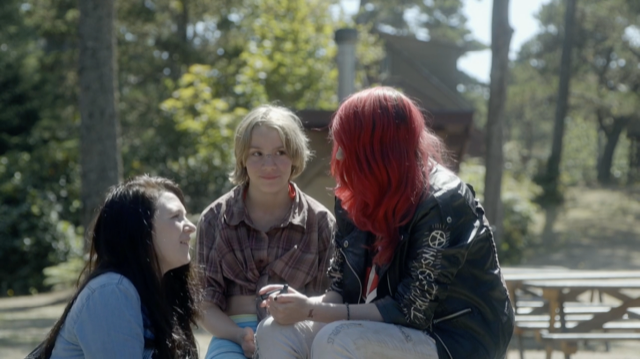Audrey Gordon is a French documentary filmmaker and former journalist. She has directed several documentaries for TV including “Kinderlekh,” “Edith and Lucile,” “A Two-way-Street,” and “90 Seconds.” “Siblings” is her feature-length debut.
“Siblings” will premiere at the 2018 Hot Docs Canadian International Documentary Film Festival on May 3.
W&H: Describe the film for us in your own words.
AG: Liberty is an 11-year-old girl living with her foster mom, far from her biological siblings. She goes to a special summer camp that brings separated brothers and sisters together. There, she not only reunites with her biological siblings but also meets Brandi, a 17-year-old girl who shares the same experience. Liberty is inspired by her, and timidly tries to approach her.
To me, this is the story of two solitary trees who meet and are drawn to each other.
W&H: What drew you to this story?
AG: While directing my first film, I met a little French girl living in the foster care system who had been separated from her brother. I started doing some research on siblings in foster care, and discovered Camp To Belong, which helps siblings to reunite once a year.
That was the beginning. When I met Liberty, I felt so connected to her that I was convinced that I wanted to tell the story through her eyes. Then I met Brandi and her sister, who also inspired me.
W&H: What do you want people to think about when they are leaving the theater?
AG: I hope that these solitary trees will find their echo — that it will make them think about how we are all just trying to find our place somewhere.
Also, I would like for people to feel as though they were really meeting Liberty and Brandi, who are both amazing women.
W&H: What was the biggest challenge in making the film?
AG: Finding the story that I truly wanted to tell. I had a first version of the film in which what I was trying to say was not very clear. I decided to go back to Oregon a year and a half later and rebuild the film with the editor.
Eventually I accepted that the story that touched me the most was the meeting between those two girls who are not sisters.
W&H: How did you get your film funded? Share some insights into how you got the film made.
AG: There were two producers — Charles Gillibert in France, and Théo Vieljeux in the U.S .— who invested in the film, and a sponsor who was touched by the subject and gave us funding for the second part. That helped us finish the film.
W&H: What does it mean for you to have your film play at Hot Docs?
AG: I feel very honored. For the first time, I have the feeling of belonging to a wider community of documentary directors. It’s funny how it echoes with the name of the summer camp in the film, Camp To Belong.
W&H: What’s the best and worst advice you’ve received?
AG: Worst advice: Wait to find funding or some kind of support before starting a project.
Best advice: Work with people you feel very connected to. I was lucky enough to meet Fanny Mazoyer, a wonderful female DP, Benjamin Silvestre, a great sound engineer, and Baptiste Saint-Dizier, a fantastic editor .
I wouldn’t have [achieved nearly as much] without this crew.
W&H: What advice do you have for other female directors?
AG: Don’t wait for someone to tell you that your idea is good. Listen to yourself and get the machine going.
W&H: Name your favorite woman-directed film and why.
AG: “Certain Women” by Kelly Reichardt. The director manages to create a bond between four beautiful women characters with unique subtlety and delicateness. This is exactly what I look for in a film.
W&H: Hollywood and the global film industry are in the midst of undergoing a major transformation. Many women — and some men — in the industry are speaking publicly about their experiences being assaulted and harassed. What are your thoughts on the #TimesUp movement and the push for equality in the film business?
AG: Of course I support the movement. I believe it is a great moment to be making films, [and] just to be a tiny part of it all.
I also think that it goes beyond the film business. The women who started the movement in Hollywood are models for so many girls in different parts of the world, including many who may never have thought that things could be different — that change was possible.







